Apr 2020 2nd Edition
Apr 2020 2nd Edition Estelle Greeff
Translations
Stay at home, save South Africa!
Stay at home, save South Africa! UrsulaThe novel coronavirus (COVID-19) outbreak has claimed thousands of lives and turned the world upside down.
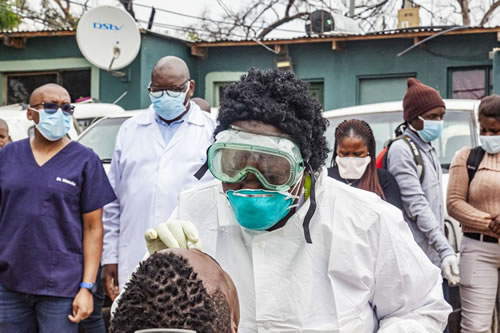 South Africa has not been spared, with its infection rate growing.
South Africa has not been spared, with its infection rate growing.
Government initially imposed restrictions to enforce social distancing but as the infections spread, a national lockdown was announced by President Cyril Ramaphosa and came into effect on 26 March.
He highlighted that never before in the history of South Africa’s democracy has the country been confronted with such a severe situation.
The President said the nationwide lockdown was a necessary move to contain the spread of COVID-19 and ‘flatten the curve’ in South Africa.
As a result, people are expected to stay home and only venture out if they absolutely have to, which means jogging and dog walking are not allowed during the 21-day lockdown. People must also buy their essentials from their closest retailer or spaza shop and should plan their trips to ensure they get home as quickly as possible and don’t have to go out again too soon.
“This is a decisive measure to save millions of South Africans from infection and save the lives of hundreds of thousands of people. While this measure will have a considerable impact on people’s livelihoods, on the life of our society and on our economy, the human cost of delaying this action would be far, far greater,” said the President.
The nationwide lockdown is being accompanied by a public health management programme which will significantly increase screening, testing, contact tracing and medical management.
Screening, testing and tracing programme
President Ramaphosa recently made another announcement that government will be rolling out a screening, testing and tracing and medical management programme on a huge scale.
“Around 10 000 field workers will be visiting homes in villages, towns and cities to screen residents for COVID-19 symptoms. People with symptoms will be referred to local clinics or mobile clinics for testing.
“People who are infected with coronavirus, but who have no or moderate symptoms will remain in isolation at home or at a facility provided by government and those with severe symptoms will be transferred to hospitals,” he added.
Using a mobile technology, an extensive tracing system will be rapidly deployed to trace those who have been in contact with confirmed coronavirus cases and to monitor the geographical location of new cases in real time.
It's simple - stay at home!
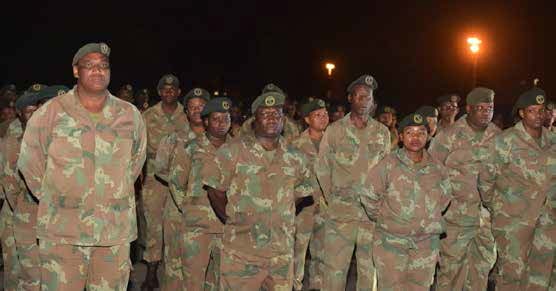 Police Minister Bheki Cele firmly told South Africans to stay at home and avoid being on the streets unnecessarily. He said they should only leave their homes to provide or seek essential services, which are listed in the COVID-19 Disaster Management Regulations.
Police Minister Bheki Cele firmly told South Africans to stay at home and avoid being on the streets unnecessarily. He said they should only leave their homes to provide or seek essential services, which are listed in the COVID-19 Disaster Management Regulations.
People who don’t obey the conditions of the lockdown could find themselves on the wrong side of the law, he warned.
The exempted conditions in which non-essential workers are allowed to leave their homes include seeking medical care, buying food, medicine and other supplies or collecting social grants.
The regulations were released by Co-operative Governance and Traditional Affairs Minister Nkosazana Dlamini-Zuma, who explained that the Disaster Management Act prohibits people from moving alcohol from one place to another. “What you have at home, you consume there at home, not next door,” the minister explained.
Areas closed to the public include religious, cultural, sporting, entertainment, educational, organisational and similar premises. This includes cinemas, parks, beaches, swimming pools, nightclubs, shops that don’t sell essential goods – such as clothing stores, casinos, markets and food stalls.
Game reserves, lodges and guesthouses also have to keep their doors closed, except those who already had international tourists booked in when the shutdown was announced. In these cases, the guests are to be kept at their lodgings under the conditions of the national lockdown.
Minister Cele warned that on-consumption premises at which alcohol is sold – including shebeens, shisanyamas and taverns – may not operate. In fact, in the hours after the lockdown was implemented, people who ignored the restrictions and were out drinking were arrested.
Should the lockdown laws be broken, perpetrators face six months in jail or fines, or both. To ensure that the lockdown is effectively implemented, the South African National Defence Force (SANDF) was deployed to support the South African Police Service.
Defence Minister Nosiviwe Mapisa-Nqakula said the lockdown is not meant to punish citizens but rather to contain and minimise the spread of the virus.
The military is assisting in roadblocks and foot patrols to enforce lockdown curfews. They are also involved in border control activities and are supporting health authorities.
Temporary shelters that meet the necessary hygiene standards have been created for homeless people.
Did you know?
- Community Health Care Workers will be going to different communities across the country to conduct door-to-door screening.
- The deployment will follow a phased and targeted approach and high-density areas such as Alexandra, Diepsloot and Khayelitsha will be visited in the first wave.
- Community Health Care Workers will be provided with uniforms and identifiable tags which will make it easier for you to identify them.
- Screening in other areas will be rolled out following the same phased and targeted approach.
Screening is essential in this fight
President Cyril Ramaphosa has informed South Africans that government will be rolling out a screening, testing and tracing and medical management programme which will see field workers visiting your communities to screen people for Coronavirus symptoms. This is why screening is important;
- Screening is a way for health workers to find out if you may have COVID-19 or not. The health worker will ask you questions and scan your forehead to take your temperature.
- The health worker will ask if you:
- Have travelled to a high-risk country in the last 14 days.
- Have had contact with anyone with confirmed COVID-19 in the last 14 days.
- Have symptoms such as fever, cough and difficulty in breathing.
- If you have travelled to a high-risk country or have had contact with someone with COVID-19 you must self-quarantine.
- This means that you should stay at home for 14 days and monitor yourself for symptoms such as a dry cough, fever and difficulty breathing. Stay away from older people and people with a compromised immune system or underlying condition such as high blood pressure or diabetes.
- Community Health Care Workers will refer persons suspected of having Coronavirus to the nearest community health centre, clinic or hospital.
- Tests will only be conducted at health care facilities and mobile testing sites.
- Not everyone will be tested, health workers will use a formula by looking at how serious your symptoms are and what high risk factors you have.
- Testing includes collecting a biological sample from a patient such as a nasal swab or a blood sample, which is then tested by a laboratory for the virus or its antibodies.
Together we can overcome COVID-19
Together we can overcome COVID-19 UrsulaDuring the first full week of the nation-wide lockdown to combat the coronavirus pandemic that is devastating the world, we were grateful for good news that brought us joy and hope at this difficult and uncertain time.
The 114 South Africans who were evacuated from Wuhan in China some weeks ago ended their quarantine and were reunited with their families. They have all tested negative for the virus and are in good health and good spirits.
For months, they had been in lockdown, first in Wuhan for some 51 days and then in Polokwane for 14 days. They were unable to be with their loved ones, unable to leave their living quarters and uncertain about when their ordeal would end. When we add the remaining 17 days that South Africa will be under lockdown they will have been under lockdown for 82 days.
It was wonderful to spend time with this diverse group of South Africans made up of all ages, languages and backgrounds. I was impressed by their resilience and courage and by their determination to remain healthy. They have come from the epicentre of the coronavirus in Wuhan in China and have seen the devastating impact this virus is wreaking on human life. It is not surprising to hear them say that they are on a mission to safe-guard the health of those around them. Now their patience and fortitude has been rewarded, because they are returning to their families.
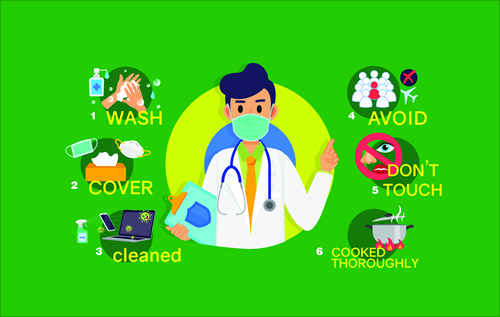 Their return home was made possible by a great many people who went to great lengths to make this repatriation operation a success.
Their return home was made possible by a great many people who went to great lengths to make this repatriation operation a success.
As a nation, we are extremely grateful to the Government and the people of China for taking such good care of our citizens, and for their assistance in organising their repatriation. It is significant that several of the South Africans in Wuhan were on study scholarships from the Chinese government; an act of generosity that is deeply appreciated.
We are grateful too to all the people who were involved in the operation, from the SAA flight crew to the medical team to the police and soldiers who brought them home. Each and every one of them stepped forward to take responsibility for the safety and well-being of others. They were prepared to undertake a difficult and dangerous mission and to subject themselves to quarantine. And now, they all tell me, they are ready for their next mission.
I wish to thank the staff and management of the Ranch Hotel in Polokwane, who took great care of the returnees. They were prepared to play their part in our national effort to overcome this disease. Everyone involved in this operation has done South Africa proud.
The experience of the South Africans in Wuhan demonstrates the effectiveness – and the necessity – of a state of lockdown. It was due to the drastic actions that the Chinese government took to contain the disease in the city of Wuhan, that all of our people were able to return uninfected and healthy.
Wuhan, a city of 11 million people in the province of Hubei, had more than 50,000 infections. Now, after more than two months after stringent lockdown measures were put in place, the province has had fewer than 20 new cases in the past two weeks.
The containment of the disease in Wuhan City, in Hubei Province and in other places across China required a massive and extraordinary effort. It involved drastic restrictions on daily life and is having a severe impact on the Chinese economy. Other countries that have taken similar measures are having greater success in managing the spread of the disease than countries that have been slower to respond.
As the total number of confirmed COVID-19 cases worldwide grows to over 700,000 and the number of deaths exceeds 33,000, we can draw lessons from these countries.
It is now abundantly clear that the most effective way for a society to contain the spread of the disease is for the population to remain at home and physically isolated from each other for at least several weeks. And it is important that this lockdown and all other emergency measures are both strictly adhered to and consistently enforced.
As the South Africans from Wuhan can testify, such restrictions on daily life, on movement and on ordinary human contact are extremely difficult to endure. In the South African context, a lockdown brings additional hardship and strain, and we are doing everything within our means to lessen the impact on our people.
But the lesson from the South Africans in Wuhan is that a lockdown works. It shows that if we strictly observe the rules in place to stop the virus spreading, we will be able to bring infection rates down. It shows that if we cooperate with health authorities in doing what we have to do, we won’t be just saving our own lives but those around us too.
The story of our South African returnees from Wuhan should give us encouragement and hope in the difficult weeks that lie ahead.
Their story tells us that there is a light at the end of the tunnel, that if we stay the course, that if we remain disciplined and respect the lockdown, that if we work together, we will overcome.
All systems go for social grant payments
All systems go for social grant payments UrsulaSocial Development Minister Lindiwe Zulu says the South African Social Security Agency (SASSA) is ready for social grant payments.
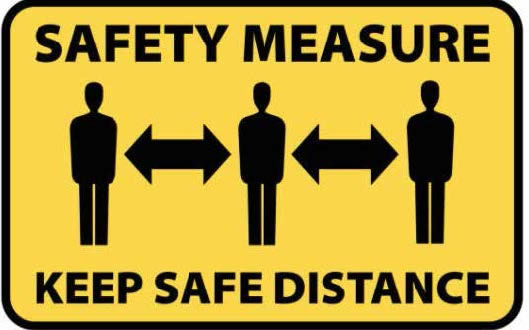 Unpacking the department’s intervention measures on Coronavirus (COVID-19) during a Social Cluster briefing held recently, Minister Zulu said retailers and the banking industry are working closely with SASSA to ensure that everyone is able to access their money.
Unpacking the department’s intervention measures on Coronavirus (COVID-19) during a Social Cluster briefing held recently, Minister Zulu said retailers and the banking industry are working closely with SASSA to ensure that everyone is able to access their money.
“We work with National Treasury to make sure that the monies are paid a bit early, so that people can access the money. We are happy that National Treasury has stepped up and made sure that everything is processed properly.
“Citizens are reminded that the elderly and people with disabilities should be allowed to access their grants on the 30th and 31st, so that they can return home as quickly as possible, given the emergency that has been declared. All other grants will be available from 31 March 2020,” Minister Zulu said.
She reminded recipients that once the money is paid into their account, it will remain there until they withdraw it.
Hygiene protocol to be enforced at retailers
Minister Zulu said hygiene protocols and social distancing will be enforced at all retailers, and cooperation is requested to ensure that everyone is attended to without any unnecessary delays.
“We wrote a letter to the Ministers of Police and Defence to request that where we might need support, we [get it],” the Minister said.
SASSA offices close
SASSA offices will be closed from 26 March until 16 April 2020, and no new applications will be processed until after the lockdown.
Minister Zulu said all applicants who need immediate assistance will be channelled to the department's Social Relief of Distress (SRD), and applications will be done through the call centre.
With regard to grant administration services, Minister Zulu said SASSA’s local offices will also be on lockdown from 26 March until 16 April 2020.
“No new applications for grants will be done during the period of lockdown. Concerns and enquiries can be directed to the call centre on 0800 601 011 or email GrantEnquiries@sassa.gov.za.”
The call centre will be operational during the lockdown.
Social services continue operations
Minister Zulu says while some shelters had to close, others like elderly centres and orphanages cannot be closed.
“Our responsibility is to make sure that we step up in supporting them and making sure that they are not left isolated,” the Minister said.
Post Office to remain open during lockdown
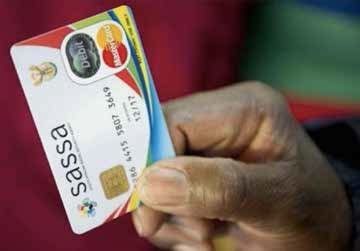 The SA Post Office (Sapo) retail branches will stay open as normal during the 21-day nationwide lockdown to facilitate SASSA payments.
The SA Post Office (Sapo) retail branches will stay open as normal during the 21-day nationwide lockdown to facilitate SASSA payments.
“… We are designated to provide this important national service and we are cognisant of the importance of social grants for a sizeable part of our population constituting mostly vulnerable people,” Sapo Acting CEO Ivumile Nongogo said.
Sapo’s social grant payment function is an essential service and is among the categories exempted from the nationwide lockdown.
In total, 882 Sapo branches have been designated to provide these services during this period.
The post office logistics services are included in the transportation of medical aid supplies. The logistics services business unit will continue to render those services.
“In order to minimise transmission risks, Sapo’s retail employees will be restricted to operating beyond one meter of each other.
“Measures have also been put in place to control the distance between queueing customers, as well as providing requisite queue marshalling services during peak times in the busy branches. Hygiene improving provisions such as sanitisers, gloves and masks are being made available to retail employees,” the Sapo said.
Nongogo said Sapo’s mail services, parcel deliveries and other support operations will be suspended in conformance with the lockdown.
Sapo's customer services contact centre will not be available. Customers are urged to not expect any outstanding deliveries to take place during this time.
Customers are also advised not to place any mail items in postboxes as mail collections will be completely suspended during the lockdown. – SAnews.gov.za
Stop and go for transport sector during lockdown
Stop and go for transport sector during lockdown UrsulaWhile South Africans have been ordered to stay at home during the lockdown, sections of the transport sector will help keep the wheels of the COVID-19 response turning.
 The 21-day nationwide lockdown means that the movement of South Africans has been heavily restricted.
The 21-day nationwide lockdown means that the movement of South Africans has been heavily restricted.
Speaking at the Justice, Crime Prevention and Security Cluster media briefing, Transport Minister Fikile Mbalula unpacked the lockdown implications for the transport sector.
He said minibus, e-hailing taxis, metred taxis and buses will only operate during specified hours for the transportation of essential services personnel – like nurses – and members of the public who need to travel to meet essential needs.
This means if you need to buy food or cleaning products for your household; go to the chemist, clinic or doctor; the vet; or go to the post office for your social grant – or make other essential trips – you may catch a taxi or bus. However, no trains will run during the lockdown.
However, these vehicles may only operate between 5am and 9am and then again from 4pm to 8pm.
The minister called on taxi operators to put measures in place to promote social distancing in order to curb the spread of the novel coronavirus (COVID-19). Social distancing is about keeping a safe distance from others so that you reduce the transmission of Covid-19.
Minister Mbalula said that in an effort to enforce social distancing protocols, there is a limit on the number of passengers that can be carried by public transport vehicles.
- A vehicle licensed to carry up to four people will only be permitted to load one person.
- A vehicle licensed to carry up to eight passengers will only be permitted to carry a maximum of three passengers.
The coronavirus is a respiratory virus, which means it’s transmitted through respiratory droplets, like when we sneeze or cough. These droplets land on surfaces and can live there for hours. Minister Mbalula therefore has also ordered that all buses and taxis must be sanitised after every trip. “All taxi ranks must also be sanitised at regular intervals.”
He explained that for sanitisers to be effective in killing the virus, they must have a minimum alcohol content of 60 percent.
The restrictions during the lockdown mean that all cross-border road passenger movement is prohibited. However, the prohibition does not apply to the cross-border movement of essential goods. This means that a truck driver bringing essential cargo may pass through a border post and continue on his journey.
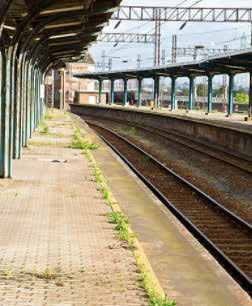 Rail commuters have also been affected by the lockdown. All long-distance passenger rail services have been stopped.
Rail commuters have also been affected by the lockdown. All long-distance passenger rail services have been stopped.
“The services of Shosholoza Meyl, Premier Classe and the Blue Train, operated by PRASA and Transnet respectively, have already been suspended. All commuter rail services will shut down for the duration of the lockdown. This includes all Metrorail and Gautrain services.”
During the lockdown period, vehicle testing centres and drivers’ licence testing centres will remain closed.
People who were booked to take their driver’s licence tests during the lockdown period will have their tests rescheduled for after the lockdown.
Motorists whose licences expire during the lockdown should not panic, however, because their licences will be deemed as valid until the end of the lockdown period, according to Minister Mbalula.
The transport of essential goods, as gazetted by government, will not be restricted. This will ensure that shelves remain stocked during the lockdown and that essential items needed in the fight against COVID-19 remain available.
Regulations will be enforced
The enforcement of the regulations will be carried out by a combination of law enforcement agencies. South African Police Service operations will include foot patrols, roadblocks and vehicle checkpoints.
The police will be assisted by the Metro Police, traffic officials and the South African National Defence Force.
Roadblocks will be conducted in residential areas and on provincial and national roads. This will ensure that people don’t break the lockdown restrictions and that the movement of people and vehicles is kept to a minimum.
At roadblocks on major roads, motorists, especially essential services workers who cross provincial borders, will be subjected to screening by officials from the Department of Health.
SA lockdown regulations
SA lockdown regulations Estelle GreeffCategorisation of essential goods and services during lockdown
Categories of essential services shall be confined to the following services:
- Medical and Laboratory Services
- Food and beverage production
- Financial and Insurance Services, Disaster Management, Fire Fighting and Emergency Services
- Grocery stores, including spaza shops
- Financial services necessary to maintain functioning of the banking and payments environment, including the JSE and similar exchanges
- Electricity, water, gas and fuel production, supply and maintenance
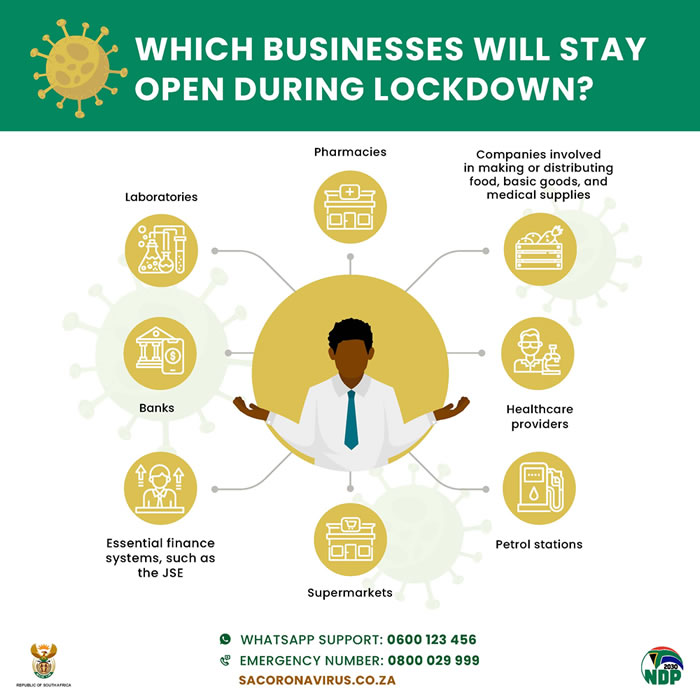
- Essential government services determined by Head of National or Provincial Departments in accordance with the guidance by the DPSA, including Social Grant payments
- Essential municipal services
- Care services provided to older persons, mentally ill, the sick, and children in need of care
- Funeral services, including mortuaries
- Wildlife Management, Animal Care and Veterinary Services
- Newspaper, broadcasting and telecommunication infrastructure and services
- Production of any chemicals, hygiene products, pharmaceuticals to the medical or retail sector
- Cleaning, sanitation, sewerage and refuse removal services
- Services related to the essential functioning of correctional services, courts, the Master of the High Court, Sheriffs and legal practitioners required for those services (but only as is strictly necessary of the period lockdown)
- Essential SARS services defined by the Commissioner of SARS
- Police, peace officers, traffic officers, military medical personnel and soldiers, and traffic management services
- Postal services
- Private Security services
- Shipping and dockyard services
- Gold, gold refinery and essential mining
- Accommodation used for persons rendering essential services and quarantine
- Production, manufacturing, supply logistics, transport delivery, critical maintenance and repair in relation to the rendering of essential services
- Transport services for persons rendering essential services and transportation of patients
- Services rendered by the Executive, members of Parliament, Members of the Provincial Legislature, and Members of Local Councils
- Commissioners of the South African Human Rights Commission, Gender Commission and the Commission for the Promotion and Protection of the Rights of Cultural, Religious and Linguistic Communities
WHATSAPP SUPPORT 0600 123 456
EMERGENCY NUMBER 0800 029 999
Sacoronavirus.co.za
Lockdown Update
Lockdown Update Estelle Greeff Every person will be confined to their place of residence unless required to perform an essential service, shop for essential goods and medicines, collect a social grant or seek emergency, lifesaving or chronic medical attention.
Every person will be confined to their place of residence unless required to perform an essential service, shop for essential goods and medicines, collect a social grant or seek emergency, lifesaving or chronic medical attention.
All gatherings are prohibited, except for funerals, which may not have more than 50 people. Movement between provinces, metro cities and districts is prohibited.
All businesses and other entities will cease operations unless involved in manufacturing, supplying or providing an essential
good or service.
Apart from grocery stores, spaza shops, pharmacies and other outlets selling only essential goods, all retail shops and shopping malls must be closed. Customers must keep at least one square metre away from each other an observe all other infection control measures.
All places of worship, public parks, beaches, swimming pools, night clubs, theatres, cinemas and casinos are closed to the public.
All hotels, lodges and guest houses are closed, except where they need to accommodate tourists who have no other place of residence in the country, or if used for quarantine and isolation.
Any places where religious, cultural, sporting, entertainment, recreational or similar activities normally take place are closed to the public.
WHATSAPP SUPPORT 0600 123 456
EMERGENCY NUMBER 0800 029 999
Sacoronavirus.co.za
Custody: Put children first
Custody: Put children first UrsulaParents with joint custody are urged to prioritise the needs of a child during the 21-day COVID-19 national lockdown.
As the coronavirus outbreak spreads across the country, the Department of Social Development said it has been inundated with calls from parents who have joint custody of their children on where their children should stay during the lockdown.
Social Development Minister Lindiwe Zulu urged parents and caregivers, including those with joint custody, to ensure the protection of children and said that their actions and decisions should be the best interests of their children.
“We urge all parents/caregivers to remain vigilant and ensure that the protection of children is given utmost consideration at this time. The COVID-19 outbreak in South Africa presents a huge risk to children as it disrupts the normal childcare arrangements for parents with joint custody,” said the Minister.
She encouraged parents to make use of technology such as WhatsApp video call, Skype and FaceTime to make sure that children are in touch with both parents.
Minister Zulu also advised parents and caregivers to monitor their online activities to prevent online abuse. She urged them to keep their children safe online while they are not at school and spend most of their time indoors.
The Minister encouraged parents and caregivers to use the lockdown period to build positive relationships with their children.
The Gender-Based Violence Command Centre will remain operational during the lockdown. Members of the public can report cases of child abuse, neglect and exploitation to the GBV Command Centre: 0800 428 428 / *120*7867# from any cell phone. Persons with disabilities, SMS “HELP” to 31531. The Women Abuse Helpline is: 0800 150 150.
– SAnews.gov.za
Repatriated citizens reunited with families
Repatriated citizens reunited with families UrsulaA heartfelt “thank you” was the central message delivered by President Cyril Ramaphosa to stakeholders involved in the repatriation of 112 citizens from Wuhan City, China.
 The President recently saw off 112 South African citizens, who will now be reunited with their families after testing negative for Coronavirus at the end of their quarantine period at The Ranch Resort in Limpopo.
The President recently saw off 112 South African citizens, who will now be reunited with their families after testing negative for Coronavirus at the end of their quarantine period at The Ranch Resort in Limpopo.
“If there ever was a true representation of Thuma Mina, you are all a representation. For the longest time, we have been talking of Thuma Mina, repeating the song of Bra Hugh Masekela. I cannot think of a single moment when it is really, truly represented in practical terms than this moment and what you have done,” he said.
The President made these remarks at the Ranch Resort in Polokwane, where the citizens were in quarantine since returning from China.
The President thanked members of the South African National Defence Force (SANDF), as well as South African Airways (SAA) pilots and crew, who were part of the repatriation mission.
The 112, who underwent a 14-day quarantine period having twice tested negative for the virus.
The Ranch staff, who have also been in quarantine, also tested negative.
The President saluted all role players for their patriotism.
“Once the mission was conceptualised, you all said ‘Send Me, Mr President’. You volunteered, you were not commandeered, and you were not drawn and dragged form wherever you were. You just stepped forward and said you want to be sent,” said the President.
The President took his hat off to the group for agreeing to be sent into dangerous territory in Wuhan City, which at the time was the epicentre of pandemic.
“You were going into an unknown territory, the real heart of Coronavirus, but you said you were willing to go. Not many people would voluntarily say they are willing to go into a danger zone.”
He saluted the SAA flight pilot and cabin crew, officials from the SA embassy in China and the Departments of Health and Home Affairs for the roles they played.
The team, together with the evacuees, was quarantined at The Ranch for 14 days. They were initially meant to be at the venue for 21 days as a precaution, but this was later revised to 14 days.
Addressing the evacuees, President Ramaphosa said government was delighted to have them back on home soil and Coronavirus-free.
“I am happy to see you healthy and alive,” he said. SAnews.gov.za
Support for tourism sector
Support for tourism sector UrsulaGovernment has offered a lifeline to the South African tourism sector in the face of the crippling coronavirus crisis.
 South Africa’s tourism sector has been grounded by the coronavirus, which has resulted in trips being cancelled or postponed.
South Africa’s tourism sector has been grounded by the coronavirus, which has resulted in trips being cancelled or postponed.
All tourism attractions, places that offer holiday accommodation and restaurants have closed as part of the nationwide 21-day lockdown, which exempts only essential services businesses.
The measures taken to contain the spread of the virus are enforceable, says Minister of Tourism Mmamoloko Kubayi-Ngubane.
The national lockdown has seen the closure of the country’s borders and the revoking of visas for tourists. Only hotels, lodges and guesthouses that have international guests who were checked in before the lockdown may remain open and must ensure their guests stay where they are.
For the duration of the lockdown, South African National Parks (SANParks) has closed all of its tourist sites to visitors, confirms SANParks CEO Fundisile Mketeni.
He says guests from high-risk countries who had arrived in the country before 9 March and were checked into a SANParks facility have been instructed to stay put.
Tourists who have had to change dates of bookings will not be penalised or charged extra fees, according to Mketeni.
Kubayi-Ngubane says her department has made a R200 million fund available to assist small, micro and medium enterprises. The fund will assist tourism businesses that make less than R2.5 million a year. Tourism businesses that are based in rural areas and townships and are run by women or young people and people with disabilities will get preference, according to Kubayi-Ngubane.
Other requirements for businesses to qualify for assistance:
- They must be formally registered with the Companies and Intellectual Property Commission.
- They must prove that the relief is required as a result of the impact of the coronavirus.
- The employment of a minimum number of employees for a period of three months must be guaranteed.
- Proof of compliance with the minimum wage must be provided.
- They should be an existing tourism-specific establishment.
- Applicants must submit financial statements of the business over a one-year period.
- They must indicate the intended use of the resources received from the fund.
In addition to these measures, a Tourism Services Call Centre, which gives information on relief measures, postponements of events and will act as a helpline for tourists, has been established.
For more information, visit: www.tourism.gov.za or call the Tourism Services Call Centre at 0860 868 747. Alternatively email callcentre@tourism.gov.za
Your labour rights during the lockdown
Your labour rights during the lockdown UrsulaThe 21-day national lockdown has had a huge impact on businesses and employees.
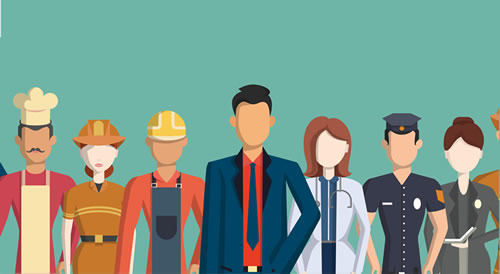 In response, government has announced a number of measures to protect all workers from the impacts of the lockdown. These include employees who work in non-essential services and who are required to stay at home for the full 21 days.
In response, government has announced a number of measures to protect all workers from the impacts of the lockdown. These include employees who work in non-essential services and who are required to stay at home for the full 21 days.
What are essential services?
A large number of workers will stay at work during the 21-day lockdown. These include those working in essential services such as healthcare, disaster management, emergency services, security, essential transport, food and essential goods production (including farm workers and grocery store workers), electricity and water provision, funeral services, media, cleaning and refuse removal and essential mining, amongst others.
Businesses and other employers who do not provide the essential services outlined by the Department of Employment and Labour must shut down during the lockdown. If you work for one of these employers, then you may wonder how you are going to earn an income to get through the coming weeks.
Help for affected workers
The Department of Employment and Labour has put in place a number of measures to protect affected employees. These include the establishment of a new COVID-19 Employee/Employer Relief Scheme (TERS) set up through the Unemployment Insurance Fund (UIF).
Employment and Labour Minister Thulas Nxesi explains that if employers have been forced to close during the lockdown, they can apply to the relief scheme to pay their employees.
“This benefit will be de-linked from the UIF’s normal benefit structure. This benefit will be at a flat rate equal to the minimum wage (R3 500) per employee for the duration of the shutdown, to a maximum period of three months,” he says.
In other words, once businesses apply for the benefit and their application is approved, the UIF will provide at least R3 500 per employee. If they earn well above the national minimum wage, then employees are entitled to receive between 38 percent and 60 percent of their normal salaries.
The minister has strongly encouraged businesses to approach the UIF so that applications can be processed quickly. However, if businesses do not approach the UIF for assistance, then employees who are working reduced hours or are not being paid can individually apply to TERS or existing UIF benefits.
What about taking leave?
Importantly, workers must be aware that employers are not allowed to force their employees to take unpaid leave during the lockdown.
The department’s chief director of labour relations, Thembinkosi Mkalipi, says that he strongly encourages employers to not force their staff to take either paid or unpaid leave.
“We encourage employers not to request employees to utilise their annual leave credits for the lockdown, but to rather utilise the financial assistance that the department has placed at their disposal through the COVID-19 TERS, in cases where companies cannot afford to pay employees.”
Employers of domestic workers have also been strongly encouraged to give their workers paid leave. If they are unable to do so, then the domestic worker will be able to claim the national minimum wage from TERS.
How do you claim from TERS or report any unfair work practices?
The Department has set up a hotline number that can be used to get advice on how to access the TERS benefit. UIF staff will be available to assist employers and employees with queries between 8am and 8pm, on Mondays to Fridays, at 012 337 1997.
Minister Nxesi has stressed that employers of those working in essential services must have all the measures in place to protect their workers. The department has already received a number of complaints about companies forcing employees to work without the necessary protective equipment.
Labour inspectors are following up on the complaints.
“At this stage, we are urging these employers to do the right thing. [After that] we will start to name and shame individual companies and branches,” he says.
If you believe you are being unfairly treated in any way by your employer during the lockdown, or that you aren’t being protected from health risks in the workplace, contact the department at 0800 843 843.
Call centres and Hotlines
Call centres and Hotlines Londekile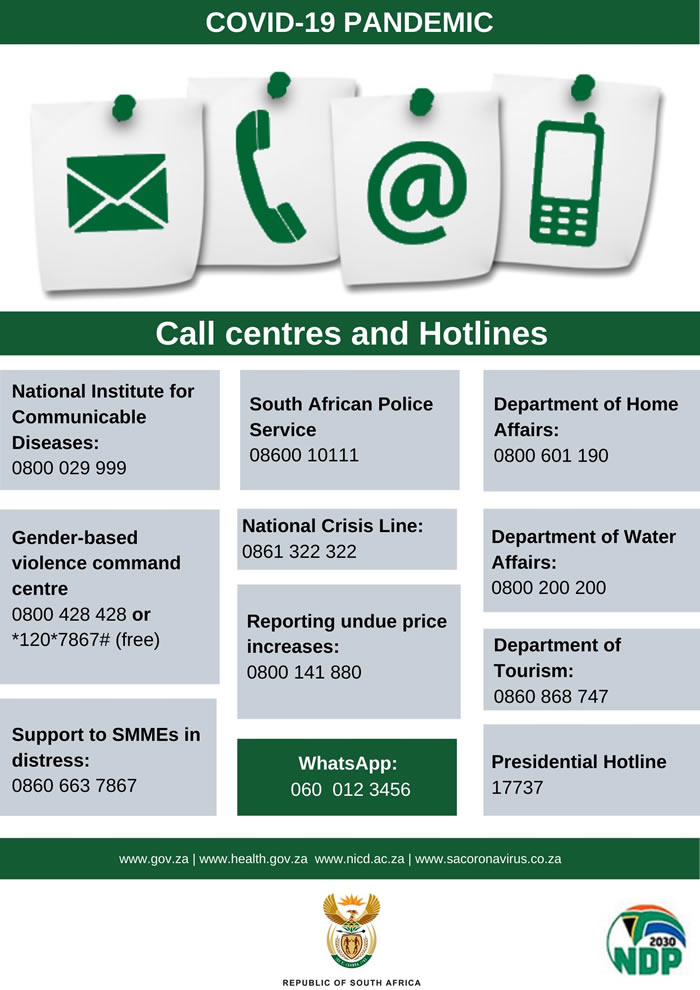
Care centre helps keep village healthy
Care centre helps keep village healthy UrsulaCommunity-based care centres are bringing essential social and health services to rural villages.
Poor families in a KwaZulu-Natal village will benefit from better nutrition, thanks to a donation by German state-owned KfW Development Bank, which was facilitated by the Department of Social Development (DSD).
The beneficiary is the Sinothandolwethu Care Centre, which is in the village of Bethany near Bergville. The centre looks after orphans, children from poor households and frail elderly people in the village. According to the chairperson of the care centre, Dombi Ngwenya, they will all benefit from healthier food.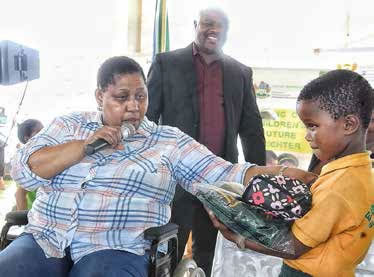
Ngwenya says one of their main concerns is ensuring that young children who have to take medication, such as antiretroviral drugs, are properly fed. “In addition, we cook lunch for the elderly, who collect their meal from the centre.”
Sinothandolwethu will receive an additional R400 000 from the DSD, which will in part be used to pay the centre’s full-time social worker and nurse, as well as the care workers who visit elderly people who live alone and have chronic illnesses. The care workers’ daily visits to the elderly ensure that people eat and take their medication as prescribed. A portion of the money will be spent on food and other necessities.
KfW is impacting lives across South Africa. It donated 9.9 million euros for the construction of 17 care centres in KwaZulu-Natal, Limpopo and North West. The rural-based care centres will offer services from the departments of social development, home affairs and health, as well as the South African Social Security Agency and the National Development Agency, among others.
The care centres will also help support already existing child protection services, such as home community-based care and drop-in centres.
Deputy Minister of the DSD Hendrietta Bogopane-Zulu says: “The goal of building community care centres in rural communities is to enhance the quality of services to orphans and vulnerable children within their own communities of origin and to complement existing child protection interventions and services.
“This approach seeks to strengthen families and communities as the first line of response as guided by South Africa’s National Strategic Plan for HIV, TB and sexually transmitted infections 2017-2022.”
Dos and don’ts during national lockdown
Dos and don’ts during national lockdown LondekileAt midnight on Thursday, 26 March, the Justice Crime Prevention and Security Cluster intensified measures to ensure that citizens comply with the regulations of the nationwide lockdown to curb the spread of the novel coronavirus (COVID-19).
Police Minister Bheki Cele said the police would work with the South African National Defence Force (SANDF) to enforce compliance.
In accordance with Annexure D of the COVID-19 Disaster Management Regulations – which lists prohibited places – police and members of the SANDF increased visibility and conducted integrated foot patrols, roadblocks and vehicle checkpoints.
“Metro Police departments as well as other law enforcement agencies formed part of these joint operations that will be conducted for the duration of the lockdown,” the Minister said.
Roadblocks were conducted at sector policing level within communities and residential areas on provincial and national roads. This was done to ensure that the movement of people and vehicles is kept to the minimum, with the exception of the transportation of essential goods and/or services, which include fire and medical emergency services,” the minister added.
At these roadblocks, motorists – especially essential services workers who cross provincial borders – will be subjected to screening by officials from the Department of Health, as outlined in the regulations.
What to do
According to Minister Cele, the simplest and best way to combat the spread of COVID-19 is to adhere to the call by the President and stay at home.
When the President declared the lockdown, he made exceptions for essential goods and services. This means the only time you should be outside of your home is to acquire or provide essential services, such as:
- medical attention (including mental health), laboratory and other medical services,
- disaster management, fire prevention, firefighting and emergency services,
- food or other goods and services as listed in Annexure B of the COVID-19 Disaster Management Regulations,
- financial services necessary to maintain the functioning of banking and payments, including the Johannesburg Stock Exchange and similar exchanges, as well as insurance services,
- production and sale of ‘essential goods’,
- electricity, water, gas and fuel production, supply and maintenance.
A detailed list is available on www.gov.za
The Minister said only those goods and services that appear in the annexure will be allowed.
“Anything outside of these lists will not be entertained,” Minister Cele said.
What not to do
- There shall be no gatherings other than for a funeral and the number of mourners will be restricted to 50. Night vigils are prohibited.
- The selling of liquor is strictly prohibited. This is also applicable to supermarkets with liquor licences. No liquor will be sold anywhere by anyone during the 21-day period of the lockdown.
- The movement of liquor between any two points is also strictly prohibited as per the COVID-19 Disaster Management Regulations. This means you cannot have alcohol on your person or in your vehicle.
“Anyone found to be in contravention of the regulations shall be found guilty and on conviction, will be liable to a fine, or imprisonment for a period not exceeding six months, or both,” the Minister said.
Meanwhile, Minister Cele said all forms of crime must be reported to 10111, which will remain fully functional during the lockdown period. The Crime Stop number (0860 010 111) is also functional and can be used to give anonymous tip-offs on suspected criminal activities.
“I warn, failure to respect and obey the laws this time around could drive us straight into a state of emergency. The situation we find ourselves in demands that we all be responsible and take the necessary precautions,” he said.
Help for artists affected by COVID-19
Help for artists affected by COVID-19 UrsulaThe arts and sports sectors will not be spared from the impact of the novel coronavirus (COVID-19) 21-day lockdown, says Sports, Arts and Culture Minister Nathi Mthethwa.
“… Sporting and creative sectors are going to be the hardest hit by these critically important measures,” the minister said.
As a result of people being confined to their homes – except for essential reasons – events have either been postponed or cancelled.
Shortly after the lockdown was announced, Minister Mthethwa convened a sectoral meeting to discuss ways to address the challenges brought about by COVID-19. Following the meeting, he said the two sectors face a desperate situation as a result of the declaration.
A number of suggestions were made during the meeting, including:
- using Fourth Industrial Revolution technology to live steam performances at which there are no audiences
- engaging the private sector, especially the financial services sector, for relief measures regarding house and car repayments, rent and other instalments
- asking government to give direction on what to do about athletes who are trapped abroad,
- engaging the Department of Communications to avail platforms for key individuals in the sector to send messages of hope and awareness,
- ensuring that the public broadcaster favours local content during this period.
“This will go a long way to alleviating the plight of artists and athletes,” the minister says.
The South African State Theatre’s Public Relations and Marketing Manager Erick Ndala says Songs & Rhythm has been postponed.
“The theatre will be re-engineering its artistic programme to ensure that projects are re-scheduled in the 2020/2021 financial year,” he says.
“We are fully cognisant of the sad but unavoidable reality that some of the cancellations and suspensions will most probably deal a catastrophic blow to some of the entities and practitioners in the arts, culture and heritage sector,” he adds.
Minister Mthethwa says the department has reprioritised its budget allocation from quarter one to avail over R150 million to provide much-needed relief to practitioners in the sector.
He added that priority will be given to artists and practitioners who were meant to be part of government-funded shows or events that have been cancelled or postponed.
Polokwane’s tech-savvy school
Polokwane’s tech-savvy school UrsulaDespite its rural location, a Limpopo primary school is unlocking the power of technology.
Pupils of a rural primary school have improved their academic results and are ahead of their peers in information and communication technology (ICT) knowledge.
The Ntji Mothapo Primary School in Ga-Mothapo village outside of Polokwane, Limpopo, is equipped with ICT learning tools such as projectors and white boards for projecting videos and images; interactive learning boards and has internet access.
The grades R to seven school, which has 1 200 pupils, also has a high-tech computer lab that is used by all grades. 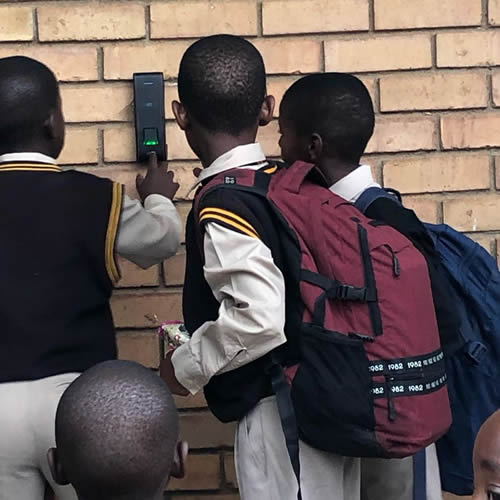
Principal Rapaledi Ngoako says the school believes the technological advancements will equip the pupils for the future academic and working environment.
Ngoako says: “The pupils are able to see the things they are being taught. They Google things; if a teacher is talking about a lion, then they can search for that lion and see it on YouTube. They now see what a lion does in the wild. This gives them a visual of what they are learning about. Pupils also work on the interactive boards during lessons.”
The school, which has an ICT committee, recently added a biometric scanner for grade four to grade seven pupils and all the teachers as part of its ICT advancements. The biometric scanner registers when pupils arrive at the school and when they leave and this information is sent to parents or guardians.
“If a parent does not get a text saying that their child has arrived at school, they can call us and we will investigate,” says Ngoako
He says the scanner also tell them if pupils leave before the end of the school day. The school plans to buy more biometric scanners, which teachers will use to clock in and out of all school periods.
The school has also installed cameras in every class, according to Ngoako.
With the Coronavirus that has swept through the world and infecting South Africans, Ngoako said his school has made the necessary precautions to ensure that the biometric system does not negatively impact on learners.
When schools reopen there will be sanitisers available at the gate for pupils.
“In addition to the hand sanitisers at the gate we will have ones next to the biometric system. The pupils will spray on their finger and on the system before they scan. We will also have sanitisers in all classes so that when pupils enter or exit a class they can sanitise their hands.
Small business support during COVID-19
Small business support during COVID-19 Estelle GreeffThe uncertainty and financial strain being placed on entrepreneurs and small business owners by the global coronavirus pandemic is being alleviated somewhat by a host of public and private support schemes.
Small business owners and informal traders are amongst the South Africans who are most heavily impacted by the lockdown. In order to get through this difficult time, these business owners can take advantage of a number of interventions that government has put in place to assist them.
SMME Debt Relief Fund
Following the announcement of the lockdown, the Department of Small Business Development immediately made a debt relief fund available for small businesses negatively affected by the COVID-19 pandemic.
More than R500 million has been made available through the fund, which small and medium enterprises must apply for through an online application process.
Here are the steps that need to be followed:
- Your business must be registered on the SMME South Africa portal. If you are not yet registered, you need to go to www.smmesa.gov.za to register.
- Once your registration is complete, you can apply for the COVID-19 SMME Debt Relief Fund. You can find the application form on the Department of Small Business Development’s website.
- If you meet all the criteria (such as your business being tax compliant and 100 percent owned by South Africans), relief funding will be paid out to approved applicants within 12 working days.
If you own a micro-enterprise, then the Small Enterprise Development Agency is available to help you to apply to the debt relief scheme. Requests for assistance must be emailed to debtrelief@seda.org.za.
Solidarity Response Fund
President Cyril Ramaphosa also announced the launch of the Solidarity Response Fund, which received a R150 million kickstart from government. The fund allows organisations and individuals to donate to the nationwide effort to support small businesses and COVID-19 response efforts.
In the first two weeks of the fund, over R2 billion was donated, which will be channelled into relief efforts.
Support for spaza shops
Government has recognised the unique challenges that the pandemic poses to those working in the informal sector. In this respect, Minister for Small Business Development Khumbudzo Ntshavheni has also released support packages for people working in this sector.
This includes a dedicated support scheme for spaza shops.
“The spaza shop support will include dedicated networking, purchasing power and bulk purchasing through pre-selected and pre-approved wholesalers,” explains the minister.
This support will allow spaza shops to gain access to goods which they can sell. Minister Ntshavheni adds that the scheme will also provide credit to spaza shop owners, to allow them to access the money needed to buy stock.
“This will be followed by a credit facility to enable spaza shop owners to continuously buy, even after the COVID-19 outbreak is over.”
The department will also provide advice on how to successfully run their shops.
“We are also supporting them with business management support because we know that there are problems in spaza shops running their businesses to be profitable,” Ntshavheni says.
Helping informal traders
Government is also working on creating a package that will provide income relief to informal traders who have lost income due to the crisis.
Informal businesses also qualify for the SMME Debt Relief Fund but are required to register with the department in the same manner as other small businesses.
For information about financial relief for small businesses, call 0860 663 7867.
Support for school learners during lockdown
Support for school learners during lockdown UrsulaThe Department of Basic Education (DBE) has put measures in place to support learners during the national coronavirus (COVID-19) lockdown.
Minister Angie Motshekga met with the Council of Education Ministers (CEM) to evaluate plans that will ensure learners are better informed about the virus and that they continue their education in their homes. The DBE also held a series of consultative meetings with provincial departments of education.
The minister said the United Nations Children’s Fund and the National Education Collaboration Trust have come on board to support the department in ensuring that the 2020 academic year it not too badly impacted.
Learner support programmes
With support from the provinces, the department has prepared online and broadcast support resources, comprising subject content, with a focus on Grade 12 learners and the promotion of reading for all the grades.
The department is working closely with key partners to co-ordinate and make available content tailored to support learners’ education and health needs during this time.
Amongst resources available, Minister Motshekga mentioned:
- Broadcast lessons (SABC TV and radio).
- DSTV channel 180.
- e.tv has allocated a dedicated channel for three months on the Openview platform.
- Broadcast of lessons on community radio stations around the country.
- Electronic readers available via all platforms in partnership with Vodacom, MTN, Telkom and Cell-C.
- 2Enable App, a freely downloadable education platform with over 2 000 electronic readers in the indigenous languages.
- Promoting the African Storybook series through the 2Enable App.
- The National Reading Coalition has identified extensive lists of additional resources and organisations that are willing to make their materials available.
- Free access to Siyavula Maths and Science support in partnership with MTN.
- Free access to the Vodacom Virtual Classroom.
“The content has been carefully curated to be available online and for broadcast, and will be made available on various platforms. The DBE website has been updated with current and relevant content, inclusive of reading resources and websites,” she explained.
Other content which is available on the websites of various education partners has also been made available, through links on the DBE website www.education.gov.za, which parents, teachers and learners are encouraged to visit.
“We urge those who are raising learners with special education needs to get in touch with the department should the need arise,” the minister said.
Reading campaign
The minister said the Read to Lead campaign and the National Reading Coalition will continue to drive their messages aimed at heightening awareness of the importance of reading for enjoyment.
“We urge households to support reading improvement initiatives by ensuring that children are given time to read, and that parents and caregivers participate by reading with their children and sharing stories,” she said.
In terms of the availability of books, she said a number of readers in various languages have been uploaded to the DBE’s online platforms.
School nutrition programme
Minister Motshekga said the effect of the lockdown on those children who rely on school nutrition programmes remains a concern but said they were working with the Department of Social Development (DSD) to find solutions.
Meanwhile, she said nutrition support will be provided to families in poverty nodes in which the DSD has a presence. A family will be allowed to collect one weekly food parcel for the duration of the lockdown.
Minister Motshekga said several partners have indicated their willingness to assist, including Tiger Brands, Nestle, Pioneer, Old Mutual, First Rand and Add Hope Foundation.
She said the exact dates for the re-opening of schools have yet to be confirmed but explained that the department is finalising an operating procedure to provide guidance to schools and education offices on how to prepare for the re-opening.
The department is in discussion with the National Treasury and all provinces on the provision of a minimum health package to schools.
Meanwhile, families and community services are encouraged to be extra vigilant in the care and support of learners. “Do not leave them unattended, watch for signs of depression and provide ongoing support to address any anxiety at this time. It is important that we continue to speak to the learners about the promotion of health and safety in the home by adhering to basic hygiene practices,” the minister said.
Tourism hard hit by national lockdown
Tourism hard hit by national lockdown UrsulaSouth Africa’s tourism sector has been grounded by the coronavirus, which has resulted in trips being cancelled or postponed.
All tourism attractions, places that offer holiday accommodation and restaurants have closed as part of the nationwide 21-day lockdown, which exempts only essential services businesses.
The measures taken to contain the spread of the virus are enforceable, says Minister of Tourism Mmamoloko Kubayi-Ngubane.
The national lockdown has seen the closure of the country’s borders and the revoking of visas for tourists. Only hotels, lodges and guesthouses that have international guests who were checked in before the lockdown may remain open and must ensure their guests stay where they are.
For the duration of the lockdown, South National Parks (SANParks) has closed all of its tourist sites to visitors, confirms SANParks CEO Fundisile Mketeni.
He says guests from high-risk countries who had arrived in the country before 9 March and were checked into a SANParks facility have been instructed to stay put.
Tourists who have had to change dates of bookings will not be penalised or charged extra fees, according to Mketeni.
Kubayi-Ngubane says her department has made a R200 million fund available to assist small, micro and medium enterprises. The fund will assist tourism businesses that make less than R2.5 million a year. Tourism businesses that are based in rural areas and townships and are run by women or young people and people with disabilities will get preference, according to Kubayi-Ngubane.
Other requirements for businesses to qualify for assistance:
- They must be formally registered with the Companies and Intellectual Property Commission.
- They must prove that the relief is required as a result of the impact of the coronavirus.
- The employment of a minimum number of employees for a period of three months must be guaranteed.
- Proof of compliance with the minimum wage must be provided.
- They should be an existing tourism-specific establishment.
- Applicants must submit financial statements of the business over a one-year period.
- They must indicate the intended use of the resources received from the fund.
In addition to these measures, a Tourism Services Call Centre, which gives information on relief measures, postponements of events and will act as a helpline for tourists, has been established.
For more information, visit: www.tourism.gov.za or call the Tourism Services Call Centre on 0860 868 747. Alternatively email callcentre@tourism.gov.za
Which businesses will stay open during lockdown?
Which businesses will stay open during lockdown? Londekile
